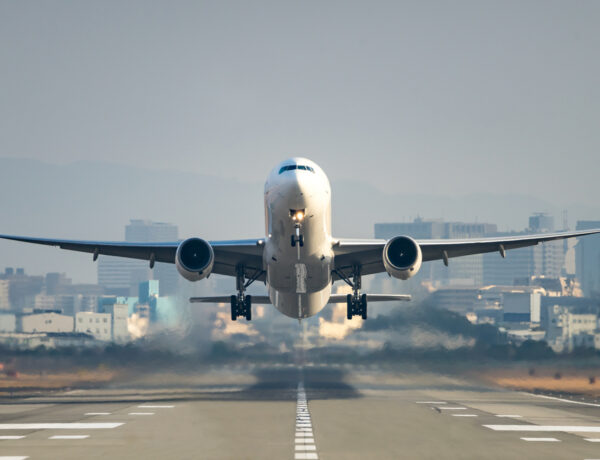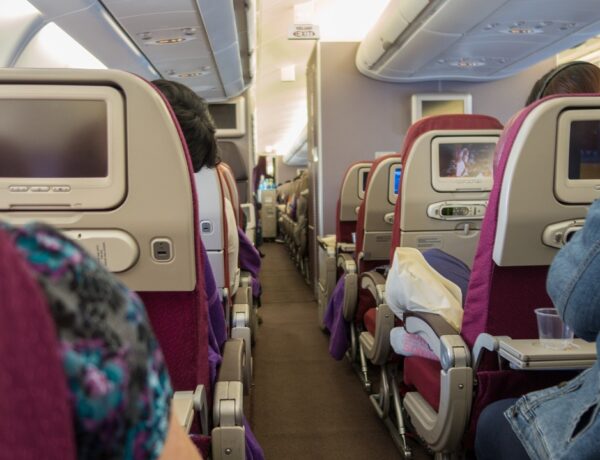I’m just back from a trip to Tokyo on ANA’s new Seattle-Tokyo Dreamliner service. More about Tokyo next week, but first – my impressions on this incredible new aircraft, mentioned last week as one of my favorite air travel innovations.
As it pulls into the gate, it’s hard to fully appreciate the marvel of engineering that is Boeing’s new 787 Dreamliner. In fact, if it were not for the 787 painted onto ANA’s first livery of the Dreamliner, you’d be forgiven for thinking it’s a 777. (For comparison, the plane is larger than a 737 but smaller than a 777 or 747.)
However, a closer inspection will reveal more clues of what’s hidden underneath. For example, the wings – they gracefully arch back, looking more like the wings of an eagle than a mechanical bird, and in fact Boeing has studied flying animals to glean ideas for improving their aircraft. And the enormous engines have back edges that might look decorative, but they’re scalloped to reduce noise inside and out.
I’m not an engineer, though if I were we could talk for days about the innovations in the plane’s electrics, fuel burn, and other systems. The plane does uses less fuel, which some day might mean cost savings on your ticket (though I suspect airlines will pocket part of the difference). But let’s talk about what it means for you, the in-flight experience.
The Dreamliner’s Game Changer in the Cabin

Not exactly a game changer, but the party lights are fun. Well played, ANA.
You can’t really see the change that allows the Dreamliner to transform the aviation experience. The plane is made from composite materials, which makes for a lighter and much more fuel efficient machine; the passenger effect is that the pressurized cabin altitude is dropped about two thousand feet (from 8,000 feet to 6,000 feet), and the cabin air humidity is increased nearly three-fold, making the cabin air MUCH more comfortable.
I cannot tell you how big of a difference this makes – I didn’t even feel like I flew, let alone a 12 hour trans-Pacific flight. I slept soundly, woke up refreshed, no headache, no need for a pile of moisturizer, no spending two days trying to pop my ears. I didn’t even feel like running for a hot shower after we landed. Serious “Wow!” factor here, folks.
Other Bells And Whistles

The Dreamliner’s “fade to dark” window.
Every carrier will be flying a different configuration of the Dreamliner – for example, ANA, the launch customer of Dreamliner, is flying very roomy cabins with just 158 passengers for international flights, but a much more economy-focused configuration for busy domestic flights. A similar arrangement is in place for United, one of the first US carriers to fly the plane. Regardless of which plane you end up on, you’ll find a number of bells and whistles, including:
- Fade-to-Dark Windows: The Dreamliner’s windows feel about twice as big, a blessing for nervous flyers. Instead of a pull-down shade, they’ve got a button that allows you to fade the window down in varying shades of blue. I spent my first flight just turning the window up and down.
- Spacious Interiors (or so you’ll think): Boeing has incorporated a number of features to make the interior of the plane more roomy. In some cases, it really is more roomy. In others, in fact, are just visual illusions to make it look more roomy. Regardless, the plane feels enormous, though I can assure you – I saw it parked next to a 747 – it isn’t as big as it seems.
- Quieter Cabin: It’s not silent, but the cabin is far, far quieter than your traditional aircraft. On takeoff, once the wheels leave the ground, it gets serenely quiet – almost too quiet. The most noise actually comes from the air conditioning, and I love white noise, so it is a great place to read, catch up on emails, or just doze.
The plane also incorporates some technology from military aircraft designed to reduce turbulence in flight, though it won’t eliminate it.
Where is the best view in the Dreamliner? Perhaps it’s from the window in the lavatory – yes, there’s a window in the loo! It isn’t frosted, but if you see someone outside that window during your flight, you’ve got bigger problems.
So what were the downsides to the Dreamliner? The only thing I did notice is that my usual carry-on size luggage didn’t fit into the overhead bin. It is a large bin, but it wasn’t quite deep enough. I had to stow it sideways, which was fine since our flight wasn’t full, but I was surprised given many airlines are installing even bigger overhead bins. I also hope that carriers don’t succumb to the pressure by squeezing in more and more seats – even the Dreamliner can’t make up for an uncomfortably overcrowded cabin.

The Boeing Dreamliner: Landing at an airport near you soon?
ANA is offering daily Dreamliner service direct from Seattle to Tokyo. Soon they will also offer direct Dreamliner service to Denver. I actually went up to Seattle the night before my flight; the Seattle Airport Radisson is the closest hotel – 5-minute walk! – and after their recent remodel, they’re a perfect layover option.
Complete with ANA’s assortment of fantastic on-board amenities and service – everything from large TVs for in-flight movies, a self-flushing toilet in the lav that even closes the seat for you, and tasty in-flight meals, I can’t think of a better way to get to Tokyo – or anywhere, for that matter.
I look forward to when the Dreamliner is a regular option on all long-haul flights. It’s a game-changer.
Editorial Disclosure: Our travel was partially sponsored by the All Nippon Airways. Geeky aviation opinions are all the author’s. Full technical specs of the Dreamliner can be found here.





No Comments